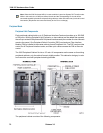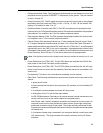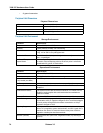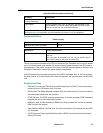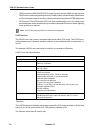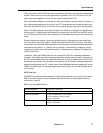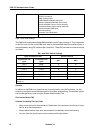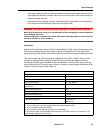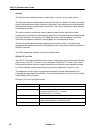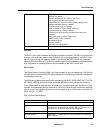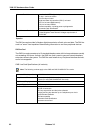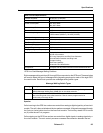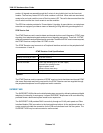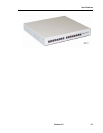
3300 ICP Hardware User Guide
80 Release 3.3
Operation
The FIM has three functional sections: a transmitter, a receiver, and a control section.
The transmitter section accepts data from the node in which it is installed. The data is converted
to byte-interleaved format, and a checksum is calculated. The checksum byte is combined with
the data and the frame synchronization information. The frame is encoded as serial data and
transmitted on the fiber.
The receiver section converts the incoming data to parallel format, extracts the frame
synchronization information, and decodes the data. Control and status information are extracted
and further decoded. The checksum is verified and an error counter updated. The status
information and data are combined, frame-aligned, and re-formatted for output.
The control section generates control signals and the transmit clocks. This section also
regenerates the telephony clocks for the peripheral nodes, and provides status information for
the Main Controller.
Two LEDs indicate the detection of local and remote clocks.
DID/Loop Tie Trunk Card
The DID/LT Trunk card terminates up to four trunks. These trunks can be Direct Inward Dialing
(DID) trunks, Loop Tie (LT) trunks, or any combination of DID and LT Trunks. Direct Inward
Dialing provides direct access to system subscriber lines from the public telephone network.
Loop Tie provides a means of connecting two systems together over a common trunk.
The assignment of trunk types is programmed through the System Administration Tool.
Programmable parameters include Dial-In Trunk versus Non-Dial-In Trunk and Loop Pulsing
versus Battery Ground Pulsing.
DID/Loop Tie Trunk Card Specifications
Variants Available: A-law (UK), µ-law (NA)
Number of Circuits per Card: 4 DID/Loop Tie trunk circuits
Power Consumption: Incoming mode (DID/DDI): 15.01 watts
Outgoing mode (Loop Tie): 5.28 watts
Mixed/Both ways: 10.14 watts
External Circuit Resistance: 2450 ohms
External Loop Length: 7986 meters (25955 ft.), 26 AWG (27 IWG)
19995 meters (64984 ft.), 22 AWG (23 IWG)
Minimum Conductor Leakage: 30000 ohms



